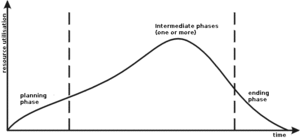Project lifecycle
| Project lifecycle |
|---|
| See also |
Project lifecycle is a set of all phases and activities (from first to last) of a particular complex project. The project as a single enterprise is burdened with a certain degree of uncertainty. Usually it is divided into phases to make it easier to supervise the realisation.
Project life cycle phases
The phases can be distinguished on the basis of their effects. If the effect is a separate, possible to verify product (e.g. feasibility study, detail design, prototype), then we can talk about the stage. Project phases help to control the project, but you must look globally for the entire project to be able to control project costs. To this end, a final inspection is performed after each stage. Review is necessary to approve effects of the previous phase and to make decision to move to the next phase (or discontinuation of the project).
In some cases, it is possible that the next phase begins before the previous is completed. This is acceptable when the risk of failure of not completed phase is low. This practice is called "fast tracking" or "overlapping".
Effects of project management lifecycle
The project lifecycle concept helps to determine what work should be done at each stage and who should participate in the individual phases. These descriptions can be general or specific. Most of the project cycles is characterized by:
- low resource use at the beginning, which increases with time, and in the last phase decreases sharply,
- the probability of success is the smallest at the beginning, and therefore there is the greatest risk of failure, the likelihood increases with time,
- the ability of customers to impact final performance parameters of the product decreases with time, it becomes obvious when we consider that the cost of changes and bug fixes is increasing in each successive phase of the project.
Please note that the project life cycle is not the same as the product life cycle. The project of introducing a new computer on the market, is only one phase of the product life cycle of this machine.
Project management phases by N.Mingus
Project lifecycle - Planning phase
This is the stage of defining and determining the important elements of the project. This phase governs matters relating to decisions taken by those involved in the project. The arrangements are recorded in a project book, where are also stated results of the project and its implementation. In this phase decisions are taken about the aspects of control and decision points for the principal and the contractor. Based on a project book main activities are identified. They make up the global project plan and a plan of work stage to stage. At the end of this phase, people involved in the project must decide whether the project should be started and performed.
Project lifecycle - Work phase
During this phase, actual goods or services are delivered, that contribute to the project and is necessary to achieve the planned results. This is the stage of implementation of certain products in accordance with the arrangements contained in the plan phase, and the project book. Project book and project plans are then adapted on the basis on the experience achieved. There are also the next phase are planned, and decision-making documents are created. They sets out the further fate of the project. It is the most important of all other stages of project management.
Project lifecycle - Evaluation phase
Evaluation of project phase runs before the end of the project or at the end of the project. During this phase comparison is made of the project results with plans. Next persons in charge of the project, the project participants and vendors are relieved of responsibility. The project team is dismissed end formal completion of the project is made. Equipment and tools are returned, and all the documents that are subject to archiving are gathered.
See also:
References
- Pinto, J. K., & Slevin, D. P. (1988, June). Critical success factors across the project life cycle. Project Management Institute.
- Mian, S. A., & Dai, C. X. (1999). Decision-making over the project life cycle: an analytical hierarchy approach. Project Management Institute.
- Ward, S. C., & Chapman, C. B. (1995). Risk-management perspective on the project lifecycle. International Journal of Project Management, 13(3), 145-149.
- Westland, J. (2006). The project management life cycle. ISBN, 749445556, 5-37.
- Westland, J. (2007). The Project Management Life Cycle: A Complete Step-By-Step Methodology for Initiating, Planning, Executing & Closing a Project Success. Kogan Page Publishers.
- Project Management Institute Webpage.
Author: Slawomir Wawak, Elżbieta Iskra
